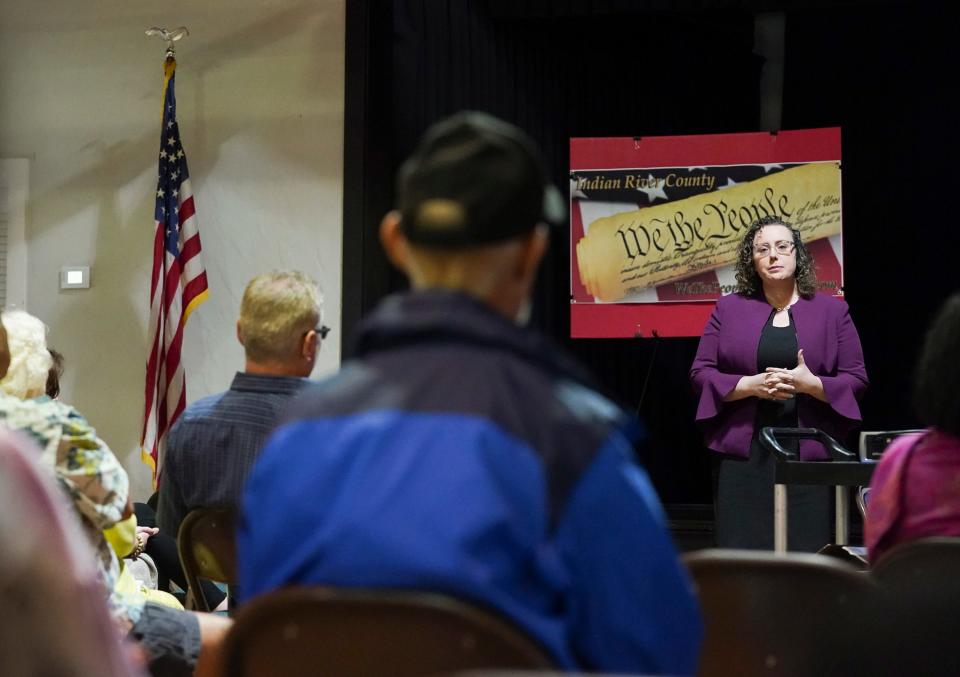Letters to the Editor: Feb. 20, 2022
- Oops!Something went wrong.Please try again later.
- Oops!Something went wrong.Please try again later.
Florida should use its infrastructure money for long-term investment
Let's hope that our legislators don’t waste Florida’s infrastructure money with political election-year stunts. These funds should be used for upgrading our infrastructure as intended.
Legislation could fund faster septic-to-sewer along our waterways (as was suggested in John Smith’s letter); purchase land to increase the flow of water south from Lake Okeechobee as arranged by then-Gov. Charlie Crist (which Rick Scott canned as governor); improve air quality in our schools (Florida’s children deserve the best environment); partner with FPL or another solar energy company installing solar in rights-of-way across the state (done with success in Georgia); or leverage funds installing charging stations for electric vehicles in rest stops on major roads (as was done by Stuart at Kiwanis Park).
We see car makers are moving toward predominantly EV and hybrid production. The funds generated from solar partnerships could allow for larger and longer-term tax reductions, incentives and investments in the future, add additional convenience for EV owners traveling around Florida, and reduce our vulnerability to energy market disruptions. With our resources Florida could be a leader in providing for tomorrow. These are just a few ideas on how to responsibly invest Florida’s infrastructure windfall.
With our traditions of freedom and innovation along with recent scientific and technological advances, Americans could enjoy a renaissance of culture and prosperity if we as a state and country would reject narrow-minded short-term ideas and embrace long-term thinking and investment.
Frank Wacha, Stuart

Deterring school fights requires clear communication of the rules
As a former assistant principal at middle schools, I can offer some insight into what does not stop fighting: lenient discipline; restorative justice (saying you’re sorry to teachers and students); in-school suspension. Students get hurt, staff end up with lifelong injuries, and property gets damaged. More importantly, the trauma to other students, teachers and staff is lifelong as well.
When county and state administration are more concerned with the appearance of the statistics than they are deterring fighting with proactive strategies like clear communication of consequences of fighting, and establishing safe and thoughtful movement of students through the halls, school administration will continue to struggle with discipline and will spend less time where their training has prepared them — in the classroom.
I worked with three African American principals in Indian River County middle schools and each one of them made it clear that the rules applied to all and should be equally applied regardless of race, gender, or sexual orientation. Fighting became a rare event under those principals with clear communication of the rules.
Students who were suspended for fighting were never penalized academically and were given every opportunity to make up their work. The best program provided in Indian River County was a temporary assignment to the alternative school for attendance with a teacher who supervised the students, encouraged them to complete their work, and used part of the day to help prepare the student to return to school and engage in appropriate conflict resolution techniques.
We assume all students come to school with the same preparation to deal with these issues and that is not always the case. Sometimes teaching is more than the three Rs of reading, writing, and ’rithmetic. The fourth R that must be taught sometimes is respect for self and others.
Chuck Evans, Playa Hermosa, Costa Rica
HB 1557 is about parental rights in education, and that’s its actual title
Cray Little's Feb. 16 letter in regard to House Bill 1557 left a lot out, including the actual name of the bill, which is the “Parental Rights in Education” bill, not the “Don't Say Gay” bill. Of course that nickname is the liberals’ version of the bill’s title.
What Little does not say in his letter is that the bill states "Classroom instruction by school personnel or third parties on sexual orientation or gender identity may not occur in Kindergarten through third grade or in a manner that is not age appropriate or developmentally appropriate for students in accordance with state standards.
This pertains to children 5 to 8 years old. As a parent I think I know what is best for my children and I sure don't want the school teaching children that young about gender and LGBT lifestyles. Schools need to be teaching our children reading, writing, math, history and science and leave the gender/LGBT issues to the parents.
Jeff Morton, Sebastian

Cheers to a good and helpful neighbor
There is a very nice lady in Vero Lake Estates who goes up and down 91st Avenue and other streets, rain or shine, picking up trash that inconsiderate people throw on the ground almost daily.
I went to a garage sale up a driveway on 91st Avenue and was struggling to lift what I had bought. She ran up and said, "Let me carry that for you." She is so wonderful for all she does. My family appreciates her. She deserves praise from everyone who lives here. There are still a lot of thoughtful people.
A big “Thank you” to her!
Suzanne Nichols, Vero Lake Estates
This article originally appeared on Treasure Coast Newspapers: Letters to the Editor: Feb. 20, 2022

